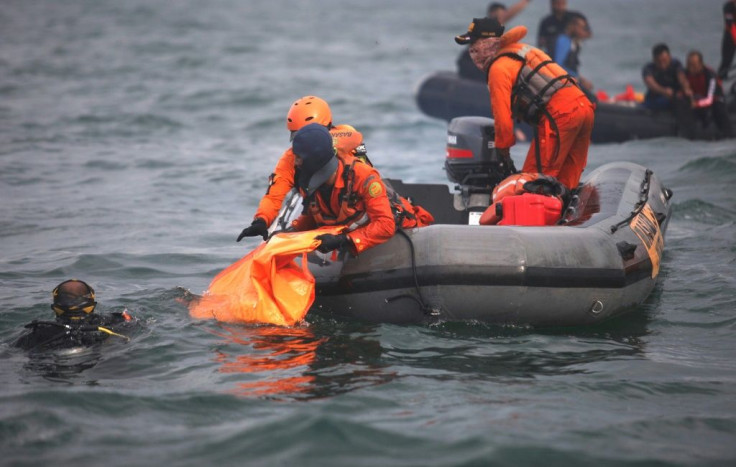Indonesian Plane Crash: What We Know
A Boeing passenger jet carrying 62 people crashed into the sea minutes after taking off from the Indonesian capital Jakarta at the weekend.
Here's what we know about the disaster so far:
The Sriwijaya Air Boeing 737-500 was en route Saturday from Jakarta to Pontianak city on Borneo island, normally a 90-minute flight, but deviated sharply from its course shortly after take-off and went into a steep dive, according to flight-tracking data and aviation analysts.
Warships, helicopters and divers were deployed in the sea off the mega-city and discovered body parts, wreckage and passenger clothing.
Divers are also looking for the plane's black boxes -- cockpit voice and flight data recorders -- after the authorities said on Sunday they have managed to pinpoint their location.
It is not clear what caused Flight SJ182 to go down near a small archipelago off Jakarta, but analysts have cited such factors as bad weather, pilot error and mechanical malfunction.
A fisherman from Lancang Island, part of the archipelago, told CNN's local affiliate that he heard a noise like an explosion or thunder around the time of the accident. He then saw big waves.
Preliminary data suggested it was "most likely" that the plane was intact when it hit the water, according to a senior Indonesian transport safety agency investigator.
The plane was carrying 50 passengers, including 10 children, and 12 crew members.
The captain was Afwan, a 54-year-old veteran aviator who flew for the Indonesian Air Force from 1987 to 1998, according to local media.
Married with three children, he was known as a devout Muslim and well-respected figure in his local community.
The profile of one of his social media accounts was reported to be a picture of Superman praying alongside the words: "no matter how high you fly, you won't reach heaven if you don't pray five times a day".
Among the passengers were newlyweds Putri Wahyuni and Ihsan Adhlan Hakim, en route to their wedding celebration.

Rapin Akbar spoke to AFP after giving blood for DNA analysis at a hospital where body bags with human remains were being taken. He said he had five relatives on board, including an older sister, a nephew and his wife and their seven-month-old baby.
It was part of the Boeing 737 Classic series, a popular workhorse aircraft that entered service in 1990. The model used by Sriwijaya Air was configured to carry a maximum of 120 passengers, according to the carrier's website.
The jet was 26 years old and had previously been flown by US-based Continental Airlines and United Airlines.
"This (plane) is considered an ageing aircraft and has special added inspections to perform by the airlines to ensure airworthiness," said Michael Daniel, a retired US Federal Aviation Administration officer who is now an international aviation consultant.
It was not a variant of Boeing's newer MAX series, which was grounded worldwide after two deadly crashes six months apart, in Indonesia and Ethiopia.
In short, yes. The number of people flying in the world's biggest archipelagic nation of over 17,000 islands has skyrocketed but safety standards have failed to keep pace.
The most serious crash in recent years was the Lion Air Boeing 737 Max accident in 2018, which claimed 189 lives, although that was blamed on the aircraft's faulty anti-stall system.
Others include the 2014 crash of an AirAsia jet with the loss of 162 lives and a year later, the crash of a military plane shortly after take-off, killing 140 people.
But Sriwijaya Air had not previously recorded a fatal crash since starting operations in 2003.
More minor accidents also occur frequently in a country where conditions for pilots can be challenging, ranging from poorly-maintained runways to mountainous terrain and sudden tropical downpours.
One of the more unusual air accidents in Indonesia happened in 2013 when a passenger jet crashed into a cow and skidded off the runway as it came into land at a small airport on Sulawesi island.
The only casualty was the cow, crushed to death under the Lion Air plane's wheels.
© Copyright AFP 2024. All rights reserved.




















